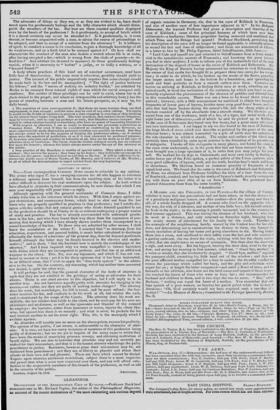ARISTIDES IN REPLY.
SIR,—Your correspondent common Sense seems to coincide in my opinion. The writer who signs C. has a sweeping censure for all who happen to entertain a different opinion from himself, but from the rambling style of his letter it is rather difficult to discover his real sentiments upon the subject. As both writers have alluded to Aristides in their communications, he now claims that which I am sure your impartiality will grant him—a reply.
Although agreeing with the general sentiments of Common Sense, I differ widely from him in the inference which he draws. With him,I argue against un- just restrictions, and unnecessary forms, which tend to shut out from the bar those who are properly qualified to practice in that profession ; but I totally dis- agree with this writer, that any natural genius who thinks himself qualified to act in the profession should he at liberty to do so without undergoing a proper course of study and practice. The bar is already overcrowded with unlearned gentle- men in the law, and who have found their way there from the reputation of pos- sessing that learning which I have already shown renders them incompetent to a sound knowledge of the law. To those who are admitted by other means, I shall leave the consolation of the writer C. I asserted that "an attorney, from his education, experience, and general habits, is much better calculated to discharge effectually the duties of a barrister of the present day, than the learned gentleman himself, although the latter may be deeply learned in the classics and mathe- matics ;" and in short, " that the barrister now is merely the conduit-pipe of the attorney." And I then inquired why we were compelled to intrust barristers with duties which they are incompetent to perform, and that too at an additional expense to the client. This, Sir, was my argument, and which C has not ven. tured to answer or deny : yet it is for these opinions that it has been insinuated, in an illiberal sense, that I wish to apply the "free trade system " in the admis- sion to the bar. On the contrary, my reasoning, which has neither been answered nor denied, is quite the other way. It will perhaps be said, that the general character of the body of attornies is
such that they are nut entitWd to the privilege of acting as advocates for their clients. There is one short answer to this objection, but I will reply to it in another way. Are not barristers equally guilty with attornies for charging in the excess,—or rather, are they not guilty of snaking undue charges ? The attorney does his work, but overcharges, his bill is taxed, and he must refund the bar- rister receives his fee, and neglects to do his work at all, but retains the cash, and is sanctioned by the usage of the Courts. The attorney does his work un- skilfully, the law renders him liable to the client, and he must pay for his own un- skilfulness and misfortune, as well as the ignorance and blunder of the counsel he employs : the barrister, either from ignorance or worse, injures the client like- wise, but against him there is no remedy ; and what is more, he pockets the fee and receives another to set his error right. This, Sir, is the monopoly which I exclaim against.
As Aristides will trouble you no more on the above points, excuse his prolixity. The opinion of the public, I am aware, is unfavourable to the character of atter- nies. It is true, we have too many instances of members of this profession being guilty of dishonesty ; but we are yet to inquire of the many cases in which they have been the means of remedying grievous wrongs, and obtaining restitution of bereft rights. We are also to consider that attornies may and are severely pu- nished for their misconduct, and that it is the honest attorney who brings the guilty practitioner to justice. Barristers, however gross their misconduct may be, are sheltered from punishment ; and they are at liberty to plunder and abuse their clients at their own will and pleasure. These are facts which cannot be denied. Impose upon attornies additional restrictions, subject them to a more inquisito- rial power than what is even now exercised over them, and you will afford satis- faction to the respectable members of this branch of the profession, as well as add to the security of the public.


















 Previous page
Previous page